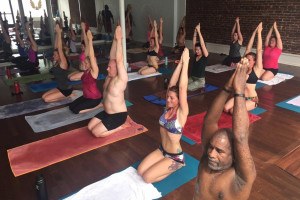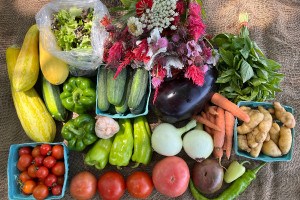These Are the Supplements Vegans Should Be Taking, According to Local Health Pros
Whether you're a long-term or fledgling vegan, check out this list of supplements.
If you’re vegan it’s inevitable that many, MANY people have questioned your health due to your diet and, also inevitably, you’re tired of hearing it. Aside from the very pressing, Where do you get your protein? investigation, people also like to ask what sort of supplements you take, if you do — in a seemingly never-ending list of questions people like to ask vegans that, if I’m being frank, aren’t any of their damn business. Okay rant over, I promise.
But chances are, if you do happen to be living a vegan life, supplements might be a necessary — or at least a good idea. Obviously, it’s ideal to eat a well-rounded plant-based diet. Meaning: don’t eat a diet of vegan junk food only. In theory, a good diet should give you most of the nutrients you need. Plus, local health coach Amandah Povilitus points out that there are great vegan-friendly food sources that can provide nutrients, like nutritional yeast.
Below, a few local health pros share some supplements that they feel are great additions to a vegan diet and why they’re beneficial. Of course, it is important to talk with your doctor and, maybe even get a few tests done (UGH, I know), to ensure that your body is getting all of the nutrients it needs — because remember, your body is a wonderland, friends!
Active B Complex
“It takes dedication and consciousness to get adequate intake of B vitamins from a vegan diet,” says Dr. Tara Nayak, a naturopathic doctor practicing in Fishtown. “This vegan-friendly supplement supports the system by providing the nutrients needed to avoid anemia, fatigue, decreased immunity and more that can happen as a result of B vitamin deficiencies.” This B-Complex uses “pre-activated B vitamins that are more readily utilized because it requires our bodies to do less work,” Dr. Nayak explains.
Vegan Omega-3 Fatty Acids
“Omega-3 supplements are popular as a daily maintenance supplement to support healthy levels of cholesterol and circulation,” according to Dr. Nayak. “Omega-3 fatty acids, EPA and DHA, also support brain and eye health and decreases overall inflammation in the body,” she explains. According to Nayak, “The ocean is the most common source of Omega 3’s used in supplementation — this one being sourced from algae, which is great for vegans who may find it challenging to find a supplement that is not made from cod, krill, or other types of living organisms.”
Prenatal Vitamin
“Nutrients commonly found in animal products, such as B12 and Iron, are top priority for vegans like myself; I personally take a daily prenatal vitamin that covers b12, folic acid, and iron to narrow any nutritional gaps,” says Kate Glutz, nutritionist at OnPoint Nutrition. “My GYN suggests opting for the prenatal over the standard multivitamin for women of child bearing age — just in case,” she explains.
Biotin
“I also routinely take biotin, which helps with hair and nail growth,” says Glutz. “Biotin is the main ingredient in hair, skin, and nail products, at a reasonable price,” says Glutz. “I’m a thrifty shopper, so I try to choose the most affordable, but best product available,” she explains. Glutz continues: “I personally like Nature Made products, and I always look for the USP stamp of approval; keeping the supplement safe and the overabundance of unnecessary ingredients out of my vitamin — 500 percent of the daily value is a little much!”
We also asked the pros to name some supplements they suggest in general — for non-vegans and vegans alike. Dr. Nayak suggests Ashwaganda — which we love — for it’s ability to bring balance and support stress responses. Kate Glutz often suggests Vitamin D and iron to her clients, especially females who may be more likely to be deficient in these areas.
Like what you’re reading? Stay in touch with Be Well Philly—here’s how:
- Like Be Well Philly on Facebook
- Follow Be Well Philly on Twitter
- Follow Be Well Philly on Instagram
- Follow Be Well Philly on Pinterest
- Get the Be Well Philly Newsletter



